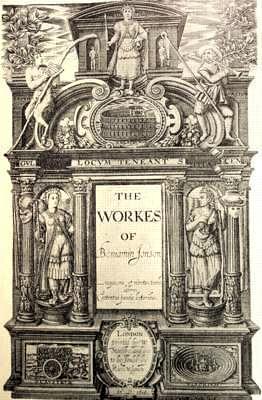Jonson on Shakespeare
There are two major comments by Ben Jonson on Shakespeare--the only extended comments on him by any of his contemporaries. The most famous of these is a long poem introducing the First Folio the first collection of Shakespeare's works. This poem is discussed on a separate page. The second comment was in his prose work Timber, or Discoveries (1630). Jonson (who was satirized for his slowness in composition) discusses the speed and ease with which Shakespeare wrote:
I remember, the players have often mentioned it as an honour to Shakespeare that in his writing (whatsoever he penned) he never blotted out line. My answer hath been, would he had blotted a thousand. Which they thought a malevolent speech. . .
And why was it thought malevolent?*
Jonson continues, with an example of lines Shakespeare should have "blotted out":
Many times he fell into those things could not escape laughter: as when he said in the person of Caesar, one speaking to him, "Caesar, thou dost me wrong," he replied "Caesar did never wrong, but with just cause," and such like, which were ridiculous. But he redeemed his vices with his virtues. There was ever more in him to be praised than to be pardoned.
So what did Caesar really say?
In the passage from Julius Caesar which Jonson mentions, the lines now read:
Know, Caesar doth not wrong, nor without cause
Will he be satisfied.
The second line (quoted in full) is short of its normal ten syllables in a play where the metre is on the whole regular; it is certainly possible that the lines were changed after Jonson's remarks in order to avoid the logical absurdity Jonson was so scornful of, if he quoted the original line correctly.
Jonson, in contrast, was satirized for his apparent slowness in writing.
Footnotes
-
Ben justifies his candour
. . .And to justify mine own candour, for I loved the man, and do honour his memory (on this side idolatry) as much as any; he was (indeed) honest, and of an open and free nature; had an excellent fancy, brave notions, and gentle expressions; wherein he flowed with that facility that sometimes it was necessary he should be stopped. . .
